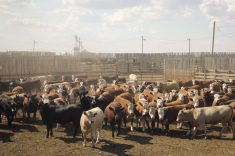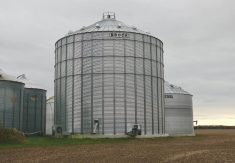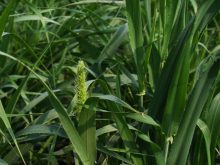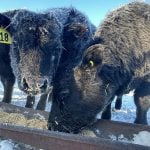Western Canadian feeder cattle prices were steady with week-ago levels as continued strength in fed cattle and lower available supplies continued to support the market.
Favourable weather allowed seeding to progress quite rapidly in most regions of the Prairies, which resulted in lower auction market volumes. Most backgrounding operations have liquidated fall-placed calves by this time of year and feedlot operations are content with current inventories heading into summer.
Feedgrain price uncertainty and sluggish deferred live cattle futures have many finishing operations uncertain about the margin structure during the summer months. Alberta packers bought fed cattle in the range of $119 to $121 and feeding margins appear to be holding above break-even. The feeder market appears stable and we need to see further upside in fed cattle prices or weaker feedgrain values in order to justify further upside for replacement cattle. Risk tolerance for finishing operators is quite low after a dreadful winter of equity erosion, so there is little incentive to bid the market higher from current levels at this time.
Read Also

U.S. grains: Soybeans continue gains on Trump’s China comments
Chicago | Reuters – Chicago Board of Trade soybeans continued a three-day rally on Friday, fuelled by President Donald Trump’s…
A small group of black Angus-based medium-frame steers averaging 750 pounds sold for $135 south of Calgary. Lighter cattle appeared to be under pressure this week, with smaller groups coming on the market. The market for cattle under 700 lbs. appeared to be ill defined, with a wide range of prices. Cattle over 800 lbs. were also quite variable, especially in the non-major feeding regions of Western Canada. Orders were not coming forward, which caused a fair amount of volatility, with limited demand noted on cattle over 850 lbs.
The U.S. Department of Agriculture’s report Friday showed April placements at 115 per cent of last year, which was above pre-report estimates. Feeders moved off small grain pasture in April and many analysts are scratching their heads wondering where all these cattle are coming from. We may see larger-than-expected third-quarter beef production given current on-feed inventories.
Wholesale choice beef prices reached an all-time high of $209 per hundredweight last week. A strong wholesale market, along with the softer Canadian dollar, should continue to support Canadian fed and feeder cattle prices into June. The U.S. hard red winter wheat harvest will occur about three weeks behind normal and this will be the first falling brick in the feedgrain price structure.
— Jerry Klassen is a commodity market analyst in Winnipeg and maintains an interest in the family feedlot in southern Alberta. He writes an in-depth biweekly commentary, Canadian Feedlot and Cattle Market Analysis, for feedlot operators in Canada. He can be reached by email at [email protected] for questions or comments.














